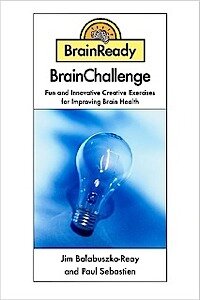
Yes, now there's even more reason to take brain exercise seriously: a new widely-acclaimed study by Rush University Medical Center involving over 700 Americans showed that mental stimulation -- including brain exercises, going to the museum or theater, reading and other mentally stimulating activities -- helps reduce the risk of Alzheimer's disease.
The study participants averaged 80 years of age at the start of the study, and underwent yearly cognitive testing for up to five years. During the study, 90 people developed Alzheimer's disease, 102 died, and researchers found that those who were "cognitively active" were 2.6 times less likely than those who got minimal mental stimulation to develop Alzheimer's disease.
Wow!
That's almost three times less likely to develop Alzheimer's.
If that doesn't make you want to start exercising your brain regularly, there's more: the study, published in the June 27th issue of the medical journal Neurology, also found that, "frequent mental stimulation was associated with a reduced risk of mild cognitive impairment -- a transitional stage between normal aging and dementia -- and less rapid decline in cognitive function". So it's not just a binary, "Alzheimer's or not" question; it's the difference between living with impaired brain function (all the way to dementia and Alzheimer's) in varying degrees, or not (or being at less far less likely to).
The researchers also said their findings may help in the development of strategies to prevent or delay Alzheimer's disease: "Alzheimer's disease is among the most feared consequences of old age," said study author Wilson, PhD, with the Rush Alzheimer's Disease Center at Rush University Medical Center in Chicago. "The enormous public health problems posed by the disease are expected to increase during the coming decades as the proportion of old people in the United States increases. This underscores the urgent need for strategies to prevent the disease or delay its onset."
For anyone who has experienced even mild cognitive impairment, or for those with family members experiencing cognitive decline, even the slightest impairment has a direct impact on quality of life.
So if exercising the brain can indeed make it almost three times less likely to develop such issues, it's a no-brainer.
Exercise your brain!
- The BrainReady Team
(How about getting a quick yet complete brain workout right now, with one of our FREE BrainReady brain exercise Podcast episodes or a BrainFlex Worksheet?)




